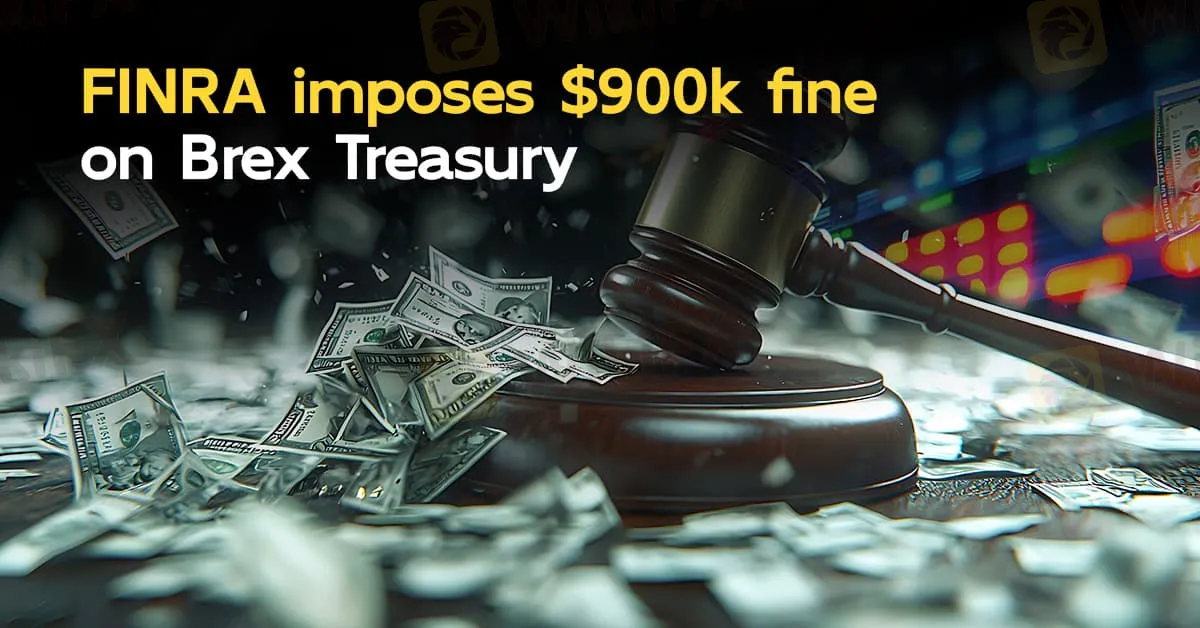简体中文
繁體中文
English
Pусский
日本語
ภาษาไทย
Tiếng Việt
Bahasa Indonesia
Español
हिन्दी
Filippiiniläinen
Français
Deutsch
Português
Türkçe
한국어
العربية
FINRA imposes $900k fine on Brex Treasury
Abstract:Brex Treasury LLC has reached a settlement with the Financial Industry Regulatory Authority (FINRA) to resolve allegations related to its anti-money laundering (AML) compliance practices. As part of the settlement, Brex Treasury has agreed to pay a fine of $900,000 and accept a censure.

Brex Treasury LLC has reached a settlement with the Financial Industry Regulatory Authority (FINRA) to resolve allegations related to its anti-money laundering (AML) compliance practices. As part of the settlement, Brex Treasury has agreed to pay a fine of $900,000 and accept a censure.
The settlement stems from Brex Treasurys use of an automated identity-verification algorithm that failed to meet AML requirements. The algorithm, which was intended to verify the identities of beneficial owners and customers, had several critical shortcomings.
Algorithm Design Flaws
Initially, Brex Treasurys identity-verification system relied on a limited set of customer information—names and phone numbers—to match identities with those in third-party databases. This approach proved inadequate, as it did not collect all the necessary identifying details, such as dates of birth, addresses, or identification numbers, required under the Bank Secrecy Act (BSA) regulations.
In January 2021, the firm began collecting more comprehensive data, including names, dates of birth, addresses, and identification numbers. Despite this, the system still fell short. The algorithm was designed to approve accounts based on matches in vendor databases, but it did not adequately address discrepancies in the date of birth or address, which could signal potential identity fraud.
Fraud Check Limitations
Brex Treasurys automated fraud checks, which included an external fraud score from a third-party vendor, were also insufficiently rigorous. The fraud score, intended to assess the risk of identity fraud, was not always accompanied by thorough manual reviews of discrepancies flagged during fraud checks. As a result, the firm approved accounts that had significant red flags.
Inadequate Manual Reviews
The firms manual customer screening process was equally flawed. From 2020 to 2021, Brex Treasury approved hundreds of potentially fraudulent accounts. These accounts attempted transactions exceeding $15 million using funds that failed to settle. Many deposits were recalled or rejected due to issues such as insufficient funds, leaving the firm unable to recover the funds or verify customer identities.
Regulatory Violations
The failures in Brex Treasury‘s AML practices led to violations of FINRA Rules 3310(b) and 2010. These rules mandate that firms maintain adequate policies and procedures for AML compliance. The firm’s inability to effectively vet customer identities and prevent fraudulent transactions highlighted significant gaps in its compliance framework.
Settlement Details
In addition to the $900,000 fine, Brex Treasury has agreed to a censure as part of the settlement with FINRA. The censure and financial penalty underscore the importance of robust AML practices and the need for firms to ensure that their identity verification systems are designed to meet regulatory standards.
This settlement serves as a reminder for financial institutions to continuously evaluate and improve their compliance mechanisms to prevent similar lapses and protect against financial crime.

Disclaimer:
The views in this article only represent the author's personal views, and do not constitute investment advice on this platform. This platform does not guarantee the accuracy, completeness and timeliness of the information in the article, and will not be liable for any loss caused by the use of or reliance on the information in the article.
Read more

Forex Hedging: Is It a Trader’s Safety Net or Just an Illusion?
In the volatile world of forex trading, risk is inevitable. One widely used strategy is forex hedging, which is a useful technique designed not to eliminate risk entirely, but to reduce its potential impact. As global economic uncertainty persists, understanding how hedging works could be an essential addition to a trader’s toolkit.

Thinking of Investing? Read Must-Know Facts About Funding pips!
When you check the internet for Funding Pips, you'd be surprised to know it's filled with praise for Funding Pips but often lacks the real facts that traders need. Everything that seems too good to be true should always be verified first. It could be Fraud . So, we conducted research and collected several facts you must know about Funding Pips.

OctaFX Back in News: ED Attaches Assets Worth INR 134 Cr in Forex Scam Case
The Enforcement Directorate (ED) in Mumbai has attached assets worth around INR 131.45 crore. This included a luxury yacht and residential properties in Spain. Read this interesting story.

Truth About Angel One – Here’s What You Need to Know
Thinking about investing in Angel One? Wait! Know the essential things about the broker before Invest. It could be SCAM. Read, think, and invest .
WikiFX Broker
Latest News
CFD Brokers Face Dual Compliance Pressures Ahead of 2026: Australia and EU Tighten Rules
Services Surveys Signal 'Expansion' In June, Inflation Fears Remain High
Major Risks Associated with AuxiliumFX: You Need to Know
ASIC cancels AFS licences of Ipraxis and Downunder Insurance Services
CFI Financial Group Becomes Official Online Trading Partner of Etihad Arena
FxPro to Launch Crypto Trading Desk, Deepening Digital Asset Push
Global Brokers Vs. Indian Rules: Why They Struggle in India
Discover 5 Benefits of Trading with Trive FX Broker
Indian regulator bars U.S. firm Jane Street from accessing securities market, impounds $566 million in manipulation probe
Asia-Pacific markets trade mixed ahead of Trump's deadline for higher tariffs
Currency Calculator


